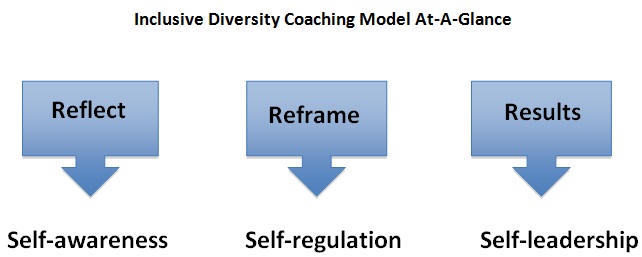A Coaching Model Created by Judy Laws
(Executive Coach, CANADA)
As workplaces become more diverse the need for inclusive diversity expertise is required. A diverse workplace includes people who differ in work background, experience, education, age, gender, race, ethnic origin, physical abilities, and all the other ways in which we differ − it is the mix. An Inclusive workplace is one that values and utilizes individual and intergroup differences, within its workforce; and cooperates with, and contributes to, the diverse community it serves. Inclusive diversity is the ability to get the mix, whether internal, external or a combination of the two, to work well together.
Many leaders and managers see the importance of diversity and inclusion however they don’t know how to translate this awareness into action. Coaching is one approach HR practitioners or Cross Cultural coaches can use when working with leaders / managers to develop their inclusive diversity expertise.
The Inclusive Diversity Coaching Model, provided below, is a simple yet powerful framework for structuring coaching sessions with individuals in helping them resolve the tension that has resulted from differences and biases present in the work environment. The intent of the tool is while resolving his or her diversity dilemma, in a positive way; the leader / manager will ultimately improve his or her inclusive diversity expertise.
 Inclusive Diversity Coaching Model in Action
Inclusive Diversity Coaching Model in Action
-
Reflect
- Identify the diversity / inclusion dilemma
- Identify the differences at stake in this dilemma
- Identify any biases attached to this dilemma
Useful coaching questions for this stage could be:
Principle to apply during this stage:
Self-awareness: having an awareness of how you feel, knowing how your emotions and your actions can affect people around you; having a clear picture of one’s own character, feelings, motives and desires.
-
Reframe
- Appreciate and respect the differences
- Identify a positive outcome
- Identify ways to resolve this dilemma
Useful coaching questions for this stage could be:
Principle to apply during this stage:
Self-regulation: consciously moderating your emotions and reactions; the ability to channel emotions into behavior that is appropriate for the situation, rather than responding with impulsive behavior.
-
Results
- Identify a plan of action
- Identify what success looks like resolving this dilemma
Useful coaching questions for this stage could be:
Principle to apply during this stage:
Self-leadership: the practice of intentionally influencing your thinking, feeling and behaviors to achieve your objective; the ability to masterfully lead yourself so you can effectively lead others.
The Inclusive Diversity Coaching model, combined with drawing on the three principles – self-awareness, self-regulation and self-leadership – will contribute to the development of the leader / manager’s inclusive diversity expertise. Finally, it is most likely that this model would work best in a corporate environment and with an organization that has a diversity strategy and/or see diversity as a competitive advantage, and wants to develop its leaders in this area. The “coach” would be “brought in” to work with the leader / manager in in developing his or her inclusive diversity expertise by working through specific diversity /inclusion dilemmas.
[1] Adapted from Barak, M. (2009). Managing Diversity: Toward a Globally Inclusive Workplace. Sage. and Tapia, A. (2009). The Inclusion Paradox: The Obama Era and the Transformation of Global Diversity. Hewitt Associates.